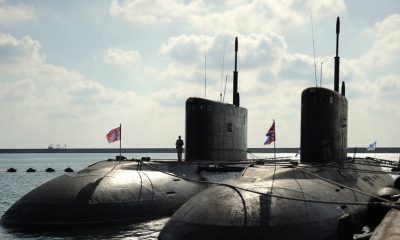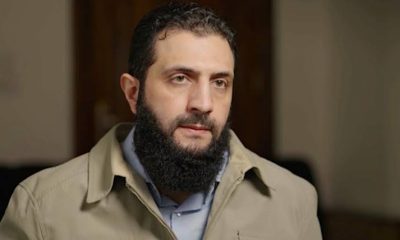Russia-Ukraine War
UK’s Starmer, France’s Macron to Address Ukraine Aid Concerns in Post-Trump Landscape

British Prime Minister Keir Starmer is set to meet with French President Emmanuel Macron on Monday in Paris, with the two leaders planning to discuss sustained support for Ukraine amid growing anxieties that a Trump administration could scale back U.S. assistance in the ongoing conflict with Russia.
The visit comes shortly after Donald Trump’s victory in the U.S. presidential election, a result that has raised alarms across Europe regarding the future of Western backing for Ukraine. Trump, who has been outspoken in his criticism of U.S. spending on Ukraine’s defense, has promised to end the conflict but offered few specifics on his approach, prompting concerns that a swift reduction in support could leave Kyiv more vulnerable to Moscow’s advances.
Starmer’s trip to Paris will also see him make history as the first British leader to participate in French Armistice Day commemorations since Winston Churchill attended in 1944. In addition to Macron, Starmer is scheduled to meet Michel Barnier, the newly appointed French prime minister, for their first official talks since Barnier assumed the role in September.
A spokesperson from Downing Street noted that discussions will focus on “Russia’s ongoing barbaric invasion of Ukraine and the worsening humanitarian crisis in Gaza.” Both Starmer and Macron are expected to reiterate the importance of a cohesive European approach to Ukraine, stressing that continued support is critical for the security and stability of the continent.
A Unified European Front
While Europe has consistently expressed strong support for Ukraine, there is recognition that replacing U.S. military aid entirely would be a formidable challenge. The Kiel Institute for the World Economy reports that European nations have allocated around €118 billion ($126 billion) in aid to Ukraine, surpassing the €85 billion ($91 billion) provided by the United States. However, critical military assets such as F-16 fighter jets and ATACMS missiles have largely come from American reserves, and European leaders have admitted that Europe alone lacks the capacity to match this level of support.
In light of these challenges, Starmer and Macron’s discussions are likely to touch upon how Britain and the European Union might enhance their collaborative efforts. Britain and the EU are already poised to begin negotiations next year on a post-Brexit security pact, which could include provisions for shared defense strategies and enhanced cooperation in energy security—an increasingly pressing issue as the conflict in Ukraine continues.
Armistice Day Symbolism and Broader EU Relations
Starmer’s participation in the French Armistice Day ceremony is steeped in symbolism. The last British prime minister to take part was Winston Churchill, who joined French General Charles de Gaulle in commemorating their countries’ shared sacrifices in World War II. Starmer’s attendance signifies not only the importance of Franco-British ties but also underscores a renewed emphasis on European unity in an era of shifting geopolitical dynamics.
Europe has witnessed a series of crises that have underscored the need for a more self-sufficient defense posture, particularly following Brexit and increasing tensions with Russia. Both Starmer and Macron see a stronger, more integrated European defense framework as a vital step toward long-term regional stability, especially given the uncertainties surrounding U.S. foreign policy in the coming years.
Starmer’s meetings in Paris come amid mounting pressure on European leaders to respond to Trump’s ascension with a strategy that prioritizes autonomy and resilience. Macron, who has previously advocated for “strategic autonomy” in Europe, may find common ground with Starmer on ways to reinforce continental defenses and reduce dependency on transatlantic support in critical sectors, including military logistics and infrastructure.
Europe’s Shifting Security Calculus
Starmer and Macron’s talks are likely to reflect a broader shift in Europe’s security calculus as leaders consider how to uphold Ukraine’s sovereignty without the same level of direct support from Washington. Some European lawmakers have called for a ramp-up in defense spending, while others have pointed to the need for deeper strategic partnerships within the EU and between the EU and the UK.
The meeting between Starmer and Barnier, now serving as France’s prime minister, also signals an evolving approach in EU-UK relations post-Brexit. While Brexit introduced significant diplomatic and logistical hurdles, recent cooperative efforts suggest a willingness on both sides to find common ground, particularly on security issues where mutual interests are clear.
As European leaders grapple with the implications of Trump’s election, Starmer’s visit to France represents an effort to reinforce a unified stance on Ukraine and an evolving strategy to navigate a changing international landscape. For Macron and Starmer alike, maintaining solidarity on Ukraine is seen as critical not just for the immediate conflict but also for Europe’s broader geopolitical strategy.
Russia-Ukraine War
Russia’s Dark Christmas Strikes: Ukraine Reels Amid Energy Crisis and International Outrage

Ukraine’s second official celebration of Christmas on December 25 was marred by darkness and despair as Russian forces launched a devastating wave of missile and drone attacks targeting the country’s energy infrastructure. This assault, described by Ukrainian President Volodymyr Zelenskyy as a deliberate and inhumane act, resulted in widespread power outages and further strained a nation already grappling with the horrors of war.
The timing of the attack appeared meticulously chosen, with President Zelenskyy emphasizing its cruel symbolism. “Putin deliberately chose Christmas for an attack,” Zelenskyy remarked, framing it as an assault not just on infrastructure but on the spirit of Ukraine. The strikes, which included ballistic and cruise missiles alongside Iranian-made Shahed drones, focused on key energy sites in Kharkiv, Dnipro, and Poltava regions. Despite Ukrainian defenses intercepting over half of the projectiles, significant damage was inflicted.
Energy Minister German Galushchenko described the assault as a massive offensive on the energy sector, disrupting heat and electricity for millions, particularly in Kharkiv, where 500,000 people faced the bitter cold without heating.
The human toll underscored the brutality of the strikes. Casualties were reported across regions: one fatality in Dnipro, six injuries in Kharkiv, and additional deaths and injuries in Kherson. Critical civilian infrastructure, including residential buildings and non-residential sites, suffered extensive damage, further exacerbating the humanitarian crisis.
State energy operator Ukrenergo imposed preemptive power outages across the nation to stabilize the grid, while private companies like DTEK reported repeated strikes on their thermal power plants, marking the 13th attack on Ukraine’s energy sector this year alone.
The global community swiftly condemned Russia’s actions. US President Joe Biden labeled the strikes as an “outrageous attack” aimed at denying Ukrainians heat and electricity during a harsh winter. Pledging continued support, Biden affirmed that the United States would expedite arms deliveries to bolster Ukraine’s defense capabilities.
While Washington’s aid commitment has reached $175 billion under Biden, uncertainty looms over future assistance as Donald Trump, known for his isolationist stance, prepares to assume office on January 20.
Russia’s attacks on Christmas underscore a clear strategy: leveraging energy crises to demoralize Ukraine and weaken its resistance. By targeting civilian infrastructure during symbolic moments, Moscow aims to deepen societal despair and project its dominance. However, the resilience of Ukraine’s defensive systems and international support demonstrate that such tactics, while devastating, have not broken Ukraine’s resolve.
Despite the chaos and destruction, Zelenskyy’s message resonated with hope. “We will restore the maximum. Russian evil will not break Ukraine and will not spoil Christmas,” he asserted, vowing that power engineers would work tirelessly to repair the damaged grid. The spirit of defiance against aggression remains unshaken as Ukraine continues its fight for sovereignty and survival.
Russia’s deliberate escalation on a day of peace and celebration reveals the depths of its strategy to instill fear and chaos. However, it also amplifies global condemnation and reinforces the unity of Ukraine’s allies. As the humanitarian toll rises, the international community faces mounting pressure to hold Moscow accountable for its actions while ensuring Ukraine has the resources to endure and rebuild.
Russia-Ukraine War
Europe’s Leadership Test in Supporting Ukraine Against Russian Aggression

Iratxe García, leader of the Socialists and Democrats (S&D) Group in the European Parliament, has issued an urgent call for Europe to assume a leadership role in supporting Ukraine against Russia’s ongoing invasion. Her rallying cry, delivered after a mission to Ukraine, highlights the shifting global dynamics and Europe’s critical role in defending democratic values.
Ukraine’s Struggle: A European Responsibility
García emphasized that Ukraine’s fight is not only about its sovereignty but a defense of European values. Facing unrelenting attacks on civilians and infrastructure, Ukraine remains resolute, rejecting any premature ceasefire that might embolden Russian President Vladimir Putin. Instead, Ukraine seeks peace through strength—a strategy aimed at forcing Russia to negotiate on terms favorable to Ukraine and Europe’s democratic order.
This perspective underlines that the war is not confined to Ukraine. García warns that if Putin’s aggression goes unchecked, other nations like Moldova, Georgia, or even EU member states such as Lithuania could be targeted, escalating the conflict into a broader confrontation between authoritarianism and democracy.
A Leadership Void in the West?
As U.S. commitment to Ukraine becomes uncertain amid domestic political shifts, García underscores that Europe must rise as a reliable partner. Her statement, “The United States will no longer be a reliable partner,” reflects growing concern over Washington’s ability to sustain its leadership role. This reality places the onus squarely on the European Union to take decisive action.
Europe’s Defining Moment
García’s call to action positions the European Union at a crossroads. Supporting Ukraine robustly would reinforce the EU’s commitment to democracy and its resolve to counter authoritarianism. Failure to act decisively risks undermining Europe’s credibility and leaving a dangerous vacuum in the global struggle for democratic values.
The stakes are clear: Ukraine’s survival is Europe’s responsibility. By stepping into a leadership role, the EU can demonstrate unity, resilience, and a commitment to the principles that define it. In this pivotal moment, Europe’s choices will shape not only the war in Ukraine but the broader geopolitical order for years to come.
Analysis
Russia’s Escalation Toward NATO and the High-Stakes Battle in Ukraine

Russia’s latest rhetoric, emphasizing the need to prepare for a potential conflict with NATO while intensifying its war in Ukraine, signals a significant escalation in its military and geopolitical posture. The remarks from Russian Defense Minister Andrei Belousov, made during a Defense Ministry meeting with President Vladimir Putin, reveal a deliberate shift toward a more confrontational stance against the West. Combined with Putin’s accusations of NATO provocation and his warnings about a “red line,” the messaging is clear: Moscow is gearing up for a prolonged struggle not only in Ukraine but potentially on a broader front against the Western alliance.
Belousov’s comments underscore Russia’s growing militarization in response to what it perceives as NATO’s encroachment. The reference to NATO’s July summit and Western doctrinal documents indicates that Moscow interprets the alliance’s actions — including increased troop deployments and expanded military budgets — as direct threats to Russian security. This interpretation aligns with Putin’s longstanding narrative that NATO’s presence near Russian borders and support for Ukraine are forms of aggression designed to destabilize Russia.
The minister’s claim that Russia must prepare for a military conflict with NATO within the next decade raises the stakes considerably. It reflects not just Moscow’s strategic planning but also its perception of the inevitability of further confrontation with the West. Belousov’s mention of NATO troop levels and doctrinal changes serves to reinforce Moscow’s framing of the alliance as a hostile force, despite NATO’s insistence that its actions are defensive in nature.
Domestically, these warnings serve several purposes. By portraying NATO as an existential threat, the Kremlin justifies its ongoing military buildup and extraordinary recruitment efforts. Belousov’s announcement that Russia has recruited over 427,000 troops this year is an attempt to project strength and readiness, countering perceptions of Russian military setbacks in Ukraine. However, such figures also underscore the extent to which the Kremlin is mobilizing its population for what it anticipates to be a long and arduous conflict.
In Ukraine, Belousov’s assertion that Russia aims to fully conquer Luhansk, Zaporizhzhia, Kherson, and Donetsk regions by next year signals Moscow’s continued commitment to its territorial ambitions. This rhetoric, combined with claims of “rapid advances” on all fronts, contrasts sharply with battlefield realities reported by independent analysts, who highlight ongoing resistance and resilience from Ukrainian forces. These statements likely serve both to bolster domestic support for the war and to pressure Ukraine’s allies by suggesting Russian momentum.
On the international stage, Putin’s comments blaming NATO and the U.S. for escalating tensions aim to shift responsibility for the conflict. His accusations that NATO countries are “scaring people with a mythical Russian threat” and increasing their military presence in Europe are designed to reinforce his narrative of Western provocation. While there is no evidence to support claims of NATO instructors operating in Ukraine, such statements serve Moscow’s broader effort to depict itself as a victim of Western hostility, justifying its aggressive policies.
Simultaneously, Putin’s rhetoric about “red lines” indicates that Russia views the current Western support for Ukraine as a significant escalation. By framing NATO’s actions as nearing an intolerable threshold, Putin is signaling a willingness to escalate further if the West does not scale back its involvement. However, this approach risks deepening the very cycle of escalation it claims to oppose, particularly as NATO countries reaffirm their support for Kyiv.
Contrasting with Moscow’s hardline stance, U.S. President-elect Donald Trump’s recent remarks emphasize a desire to end the conflict through diplomacy. Trump’s call for Ukrainian President Volodymyr Zelenskyy to “be prepared to make a deal” reflects a pragmatic but controversial perspective, as it suggests a potential shift in U.S. policy toward pressuring Ukraine to negotiate. While this aligns with Trump’s broader skepticism of prolonged foreign entanglements, it risks alienating key U.S. allies in Europe who see a negotiated settlement under current conditions as capitulation to Russian aggression.
The broader implications of Russia’s warnings about NATO extend beyond the immediate conflict in Ukraine. They reflect a deliberate effort by Moscow to frame the current war as part of a larger ideological and geopolitical struggle against Western dominance. For NATO, this poses a dual challenge: maintaining unity in support of Ukraine while managing the risk of further escalation with Russia. NATO’s recent measures, including bolstering troop levels and enhancing its eastern flank, indicate that the alliance is taking Moscow’s threats seriously. However, these actions also feed into Russia’s narrative, potentially exacerbating the very tensions they aim to deter.
In conclusion, Russia’s intensified rhetoric and preparations for a potential conflict with NATO highlight the deepening polarization between Moscow and the West. For Ukraine, the stakes remain existential, as Moscow shows no sign of easing its territorial ambitions. For NATO, the challenge lies in balancing deterrence with the risk of escalation, as Russia’s narrative increasingly frames the alliance as a direct adversary. As the conflict continues, the global implications of Russia’s militarized posture and the West’s response will shape the geopolitical landscape for years to come.
Russia-Ukraine War
North Korean Troops Confirmed Fighting Alongside Russia in Ukraine, Pentagon Says

The Pentagon has confirmed that North Korean forces are actively engaged in combat alongside Russian troops in Ukraine, marking a significant escalation in Pyongyang’s involvement in the war.
“North Korean soldiers have engaged in combat in Kursk with Russians, alongside Russian forces,” Pentagon press secretary Major General Pat Ryder said Monday, adding that the North Koreans have suffered casualties, including deaths and injuries. For now, their participation is reportedly limited to the Kursk region in Russia.
While the Pentagon has not detailed the extent of North Korean casualties, Ukraine’s military intelligence reported that at least 30 North Korean soldiers have been killed or wounded in fighting across several villages in the Kursk region.
A Noticeable Escalation
U.S. intelligence previously reported that North Korea had sent approximately 12,000 troops to train with Russian forces, but their involvement in direct combat began only within the past week.
Ukrainian President Volodymyr Zelenskyy accused Russia of attempting to hide North Korean losses. “There is not a single reason for North Koreans to die in this war,” Zelenskyy said Monday, emphasizing that the Russian government is trying to “conceal the losses of the North Koreans” in ongoing battles.
The Pentagon reinforced Ukraine’s right to target North Korean troops. “Those [North Korean] forces are legitimate military targets for the Ukrainians, given that they are engaged in active combat operations,” Ryder said.
International Reactions
The involvement of North Korean troops has drawn swift condemnation from the U.S. and its allies. In a joint statement, U.S. officials called Pyongyang’s actions a “dangerous expansion” of the conflict, warning that deploying North Korean troops further into Ukraine would escalate tensions.
State Department spokesperson Matthew Miller said Monday, “If they [North Korean troops] were to cross the border into Ukraine, that would be yet another escalation,” underscoring the global concern over Pyongyang’s growing alignment with Moscow.
The Kremlin and Russia’s Ministry of Defense have yet to respond to allegations about North Korean troops’ participation.
Support for Ukraine
In response to the deepening conflict, Norway announced $242 million in new military aid to Ukraine, focusing on Black Sea defense and mine-clearing operations. Norwegian Prime Minister Jonas Gahr Støre highlighted the importance of safeguarding Ukraine’s infrastructure and grain exports, which are vital to the country’s economy.
Norway’s Defense Minister Bjørn Arild Gram said the aid package will help Ukrainian forces detect and remove mines, which remain a persistent threat in the Black Sea.
Additionally, Ukraine’s air force reported intercepting 27 of 49 drones launched by Russian forces overnight, with debris causing minor damage to power lines in the Cherkasy region but no casualties.
A New Dimension to the Conflict
The involvement of North Korean forces adds a new layer of complexity to the war in Ukraine, as Moscow deepens its reliance on foreign partners to sustain its offensive. This development also underscores the growing strategic alignment between Russia and Pyongyang, a partnership likely motivated by shared opposition to Western powers.
For Ukraine and its allies, the presence of North Korean troops represents both a tactical challenge and an opportunity to highlight the global implications of Russia’s war. The continued flow of international aid, coupled with diplomatic pressure on Moscow and Pyongyang, will be critical in countering this new escalation.
Russia-Ukraine War
Can Trump Bring an End to the Russia-Ukraine War?

As Biden Escalates with Long-Range Missiles, Trump Faces the Challenge of Ending the Conflict
The Russia-Ukraine war may be entering a pivotal phase as Donald Trump prepares to take office, promising to end the conflict swiftly. However, Biden’s decision to authorize long-range missile strikes on Russian territory raises questions about NATO’s broader objectives and the challenges awaiting Trump’s diplomatic efforts.
Trump’s campaign boast that he could end the war in a single day is under scrutiny as he inherits a complex geopolitical puzzle. Speculation is rife about his potential strategies, including rumors of a monitored ceasefire along current battle lines—though such plans would effectively accept Russian annexations and open the door to heated debates over implementation. For now, Russia appears to hold the upper hand on the battlefield, prompting doubts about what incentives Vladimir Putin might have to negotiate, especially with a president-elect who has signaled a willingness to deprioritize Ukraine.
Meanwhile, Europe braces for the possibility of bearing greater responsibility for Ukraine’s plight. Trump’s view of NATO allies as freeloaders suggests that the U.S. may pivot its focus to other global hotspots, such as the Middle East and East Asia. Europe, already grappling with internal crises, including political turmoil in France and Germany, appears ill-prepared for this added burden.
Biden’s last-minute decision to deploy the ATACMS long-range missile system is particularly provocative. While some see it as an attempt to lock Trump into continuing the war, others suspect a calculated effort to extract concessions from Putin. Regardless, the move risks escalation, testing the limits of Russia’s response. Moscow has countered by deploying hypersonic missiles—a capability that many NATO countries lack—underscoring the West’s vulnerability in advanced warfare technologies.
For Trump, the war presents a dual challenge: negotiating an end to the conflict while addressing the deeper structural flaws in U.S. foreign policy. Critics argue that decades of miscalculated strategy have underestimated Russia’s resolve and overestimated NATO’s leverage. Trump’s ability to break this cycle could determine the war’s outcome, but the risks of miscalculation remain high.
As the situation unfolds, one reality becomes increasingly clear: a protracted war benefits no one. A quick, pragmatic resolution is needed more urgently than ever, yet the prospects for such a breakthrough remain as uncertain as the fates of the leaders steering this geopolitical storm.
Russia-Ukraine War
Russia warns the United States of the risks of World War Three After Ukraine’s attack on Kursk
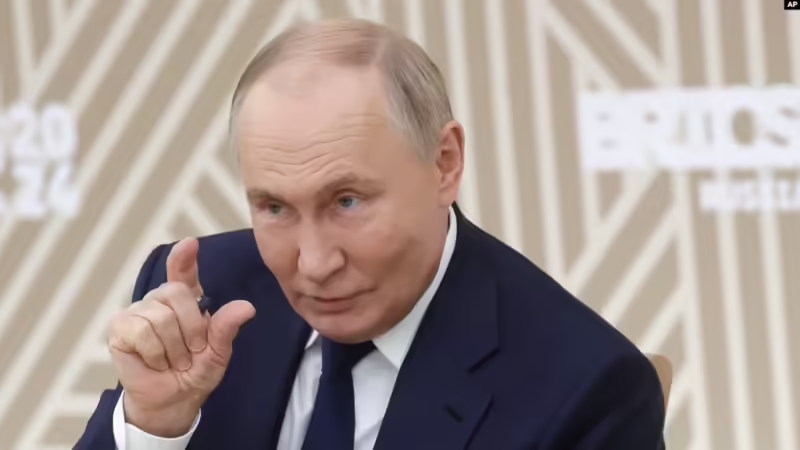
Tensions between Russia and the West have reached a fever pitch following Ukraine’s unprecedented attack on the Kursk region, which Moscow described as the most significant assault on its territory since World War II. Russian officials have escalated their rhetoric, warning that any further provocation could push the conflict beyond Europe’s borders and spark a global confrontation.
Foreign Minister Sergei Lavrov condemned Western support for Ukraine, accusing NATO allies of “playing with fire” by considering loosening restrictions on Kyiv’s use of foreign-supplied weaponry. Lavrov’s remarks reflected Moscow’s growing alarm at what it perceives as Western complicity in the Kursk assault, which Kyiv executed using advanced U.S.-made HIMARS missiles to target key infrastructure.
Lavrov reiterated that Moscow’s nuclear doctrine, clarified in 2020, permits the use of nuclear weapons under conditions that threaten the state’s existence, whether via nuclear, mass destruction, or conventional means. The foreign minister stressed that the United States and its allies underestimate the global consequences of their actions, stating, “World War Three will not be confined to Europe.”
Ukraine’s operation in Kursk, involving HIMARS and other advanced systems, demonstrated Kyiv’s increasing willingness to target Russian heartland regions. While Ukrainian President Volodymyr Zelensky called Kremlin threats of retaliation a bluff, Russia’s leadership insists the attack was a calculated move by Kyiv, bolstered by Western intelligence and resources.
According to reports, the United States and Britain provided satellite imagery and intelligence on Russian troop movements in the days after the attack. Although Washington denies direct involvement in planning the operation, Moscow claims the evidence points to U.S. complicity, with Deputy Foreign Minister Sergei Ryabkov calling it “an obvious fact.”
Russian President Vladimir Putin vowed a “worthy response” to the incursion, but analysts suggest Moscow faces limited options given the significant strain its military is already under in Ukraine. This has led to speculation about whether Russia might escalate its response asymmetrically, such as targeting Ukrainian allies more directly.
Moscow’s warnings underscore the fragility of the current geopolitical landscape. While NATO has sought to balance its military support for Ukraine with efforts to avoid direct confrontation with Russia, the Kursk incident exposes the razor-thin margin for error. Lavrov’s comments suggest that Russia may be willing to expand the scope of the conflict, potentially dragging NATO members into direct hostilities.
For Kyiv, the attack demonstrates a willingness to push the limits of Western backing, urging allies to approve bolder measures such as granting access to long-range missile systems. However, such moves risk escalating tensions further, especially as Moscow reasserts its readiness to defend its territory with nuclear capabilities if necessary.
As the Kursk strike reverberates through diplomatic channels, Russia’s warnings highlight the ever-growing risks of global escalation. The West faces a critical juncture: whether to double down on its support for Ukraine or recalibrate its strategy to avoid a potential spiral into World War Three. For now, the path forward remains fraught with peril and uncertainty, with the stakes growing higher by the day.
Russia-Ukraine War
Scholz stands by Ukraine amid criticism at home

German Chancellor Olaf Scholz reaffirmed Germany’s military support for Ukraine during a surprise visit to Kyiv, promising to assist “for as long as it takes.” Speaking alongside Ukrainian President Volodymyr Zelenskyy, Scholz emphasized Germany’s commitment to Ukraine while defending his cautious stance on supplying long-range Taurus missiles, citing escalation risks with nuclear-armed Russia.
Scholz’s visit comes as Germany faces heated domestic debates over Ukraine policy, with elections looming in February. Conservative leader Friedrich Merz, a key challenger, has criticized Scholz for withholding the missiles and promised a firmer stance toward Russia if elected. Scholz countered by labeling Merz “unpredictable” on matters of war and peace.
Despite the criticism, Germany remains a leading military donor to Ukraine, having provided €28 billion in aid. However, Scholz’s refusal to supply Taurus missiles contrasts with other Western powers like the U.S. and U.K., which have equipped Ukraine with long-range weaponry. Zelenskyy underscored the strategic importance of the Taurus missiles during the visit, noting they could significantly bolster Ukraine’s defensive capabilities.
Domestically, Scholz faces mounting challenges. His Social Democratic Party (SPD) trails far behind Merz’s Christian Democratic Union (CDU) in polls, with only 15% support compared to the CDU’s 32%. Meanwhile, Germany grapples with economic stagnation, a prolonged recession, and labor unrest, including widespread strikes at Volkswagen plants. Critics, including Merz and members of the Greens, accuse Scholz of using Ukraine policy to deflect attention from Germany’s internal crises.
Scholz’s trip is seen by many as an effort to bolster his statesmanship ahead of elections, though questions remain about his ability to reconcile Germany’s foreign commitments with pressing domestic concerns.
Russia-Ukraine War
Zelenskyy Calls for NATO Guarantees to End “Hot Phase” of Ukraine War

Ukrainian President Volodymyr Zelenskyy has proposed that NATO extend guaranteed protections to areas of Ukraine not currently occupied by Russia, suggesting this step could halt active hostilities in the ongoing war. Speaking to Sky News, Zelenskyy called for these territories to be brought under the “NATO umbrella” while maintaining Ukraine’s internationally recognized borders.
Zelenskyy argued that securing the unoccupied regions under NATO would allow Kyiv to pursue diplomatic negotiations for the return of Russian-controlled territories. “If we want to stop the hot phase of the war, we should quickly take under the NATO umbrella the territory of Ukraine that we have under our control,” he said.
However, Zelenskyy stressed the importance of a comprehensive NATO invitation covering all of Ukraine’s territory. Offering partial membership, he said, would implicitly acknowledge Russian claims over occupied areas. “You can’t give an invitation to just one part of a country,” he noted, emphasizing the need to reinforce Ukraine’s sovereignty.
The suggestion, which Zelenskyy admitted has not been formally proposed to Kyiv, could form the basis of a cease-fire agreement with Moscow. NATO has yet to respond to the idea.
Intensifying Conflict
The war, nearing its third year, has seen recent escalations. Russia threatened strikes on Kyiv government buildings following Ukraine’s use of advanced Western-supplied weaponry against Russian territory. Meanwhile, Moscow has continued its attacks on Ukraine’s energy infrastructure.
Zelenskyy argued that cease-fires without robust deterrence mechanisms, like NATO guarantees, would leave Ukraine vulnerable to further aggression. “Only NATO membership could offer that kind of guarantee,” he said.
Leadership Shake-Up in Ukraine’s Armed Forces
In a separate announcement, Zelenskyy revealed significant changes to military leadership. Major General Mykhailo Drapatyi has been appointed as commander of Ukraine’s land forces, replacing Lieutenant General Oleksandr Pavliuk. The president emphasized the importance of restructuring to achieve better outcomes on the battlefield, calling the land forces “the backbone of our army.”
Zelenskyy’s comments highlight the strategic importance of NATO’s potential role in shaping Ukraine’s defense and diplomatic strategies. While speculative, the proposal underscores Kyiv’s search for long-term security solutions amid intensifying conflict and evolving leadership.
-

 Modern Warfare5 months ago
Modern Warfare5 months agoLeaked Files: Russia’s Navy Trained for Nuclear Strikes on Europe
-

 Top stories4 months ago
Top stories4 months agoProtests Surge Over Brutal Rape and Murder of Indian Doctor
-

 Middle East4 months ago
Middle East4 months agoWhite House Signals Heightened Alert Amid Iranian Threats and Ceasefire Talks
-

 Top stories4 months ago
Top stories4 months agoRussia Bans 92 Americans Amid Rising Tensions with Washington
-
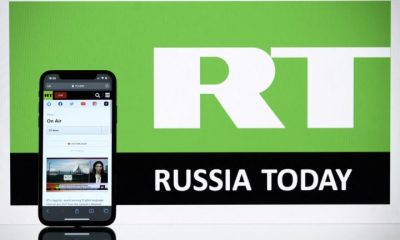
 Digital Battleground4 months ago
Digital Battleground4 months agoU.S. Unleashes All-Out Assault on Russian Disinformation Machine
-

 Military4 months ago
Military4 months agoRussia and China’s Bold Military Showdown: A Direct Challenge to U.S. Power
-

 Analysis3 months ago
Analysis3 months agoHow Israel, Iran, Russia, Houthis, China and U.S. Could Ignite World War III
-
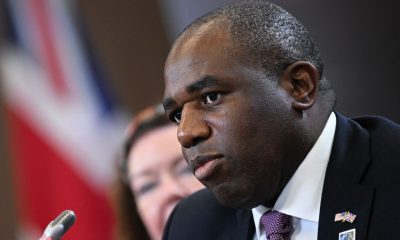
 Diplomacy3 months ago
Diplomacy3 months agoWestern Diplomatic Scramble to Prevent Middle East Explosion



